【精编文档】江西省南昌十中2018-2019学年高一英语3月月考试卷.doc
江西省南昌市第十中学2018-2019学年高一下学期期中考试英语答案
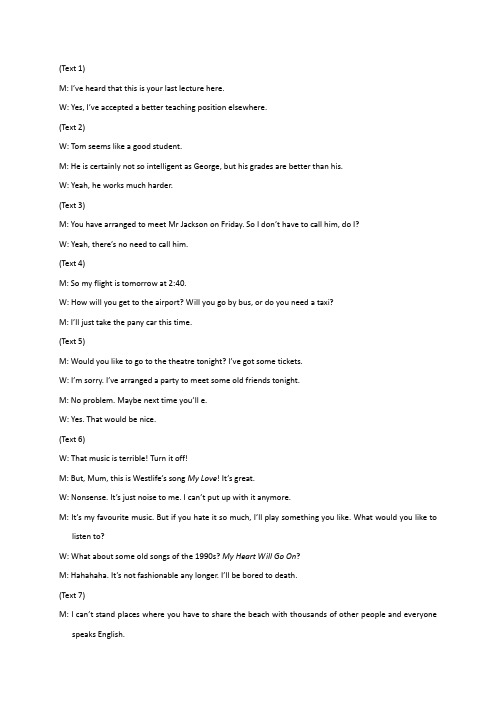
(Text 1)M: I’ve heard that this is your last lecture here.W: Yes, I’ve accepted a better teaching position elsewhere.(Text 2)W: Tom seems like a good student.M: He is certainly not so intelligent as George, but his grades are better than his.W: Yeah, he works much harder.(Text 3)M: You have arranged to meet Mr Jackson on Friday. So I don’t have to call him, do I?W: Yeah, there’s no need to call him.(Text 4)M: So my flight is tomorrow at 2:40.W: How will you get to the airport? Will you go by bus, or do you need a taxi?M: I’ll just take the pany car this time.(Text 5)M: Would you like to go to the theatre tonight? I’ve got some tickets.W: I’m sorry. I’ve arranged a party to meet some old friends tonight.M: No problem. Maybe next time you’ll e.W: Yes. That would be nice.(Text 6)W: That music is terrible! Turn it off!M: But, Mum, this is Westlife’s song My Love! It’s great.W: Nonsense. It’s just noise to me. I can’t put up with it anymore.M: It’s my favourite music. But if you hate it so much, I’ll play something you like. What would you like to listen to?W: What about some old songs of the 1990s? My Heart Will Go On?M: Hahahaha. It’s not fashionable any longer. I’ll be bored to death.(Text 7)M: I can’t stand places where you have to share the beach with thousands of other people and everyone speaks English.W: Oh, I don’t mind that.M: Oh, I do. I never go to places like that. I like to get right away from all the tourists, go somewhere that’s really quiet and peaceful, like an island or something, where no one speaks English.W: What’s wrong with people speaking English? I like meeting people when I’m on holiday. I like places with a good night life, and plenty of people around and ... well, you know, where you can have a good time.(Text 8)W: You don’t look very well.M: Yes, I was so busy handing out leaflets at noon that I didn’t have time to have lunch. And I’m tired out now.W: Why do you have to do such things?M: I do it for the Students’ Union. We’re going to hold a da ncing party next week and we need to make it known by handing out leaflets. To tell the truth, I’m fed up with it. I want to quit.W: Why? Isn’t it a great honour to be in the Students’ Union?M: But I really don’t like wasting time in pointless exercises like this. You know we have lots of exams this term.W: That’s true. And our teachers are strict with our homework. Anyway, there are many interesting things in the Students’ Union. It gives you a chance to make friends and do something useful for society. (Text 9)W: Good morning, Eric. Did you move into your new house?M: Yes. I moved in last weekend. It’s a townhouse in the suburbs.W: Oh, great. So how is your neighbourhood?M: I guess it’s not bad. The air is fresh. There is no heavy traffic even in th e rush hours.W: Good place. Are there any convenience stores nearby?M: Yes, there are. There is also a supermarket nearby.W: That’s good for you. And is there any public transportation near your home?M: Well, there is no bus at the moment. I could take our pany’s bus, but I never do that. I prefer to drive myself. About 30 minutes. What about you?W: I take the subway. Oh, it’s time to work. Nice talking to you. Have a nice day.M: Thanks. You, too.(Text 10)M: Hi, everyone. I thought I would introduce myself as part of this site, and at the same time, make this introduction into a listening quiz. As you know, my name’s Randall Davis, and I’m originally from Indianapolis, Indiana, in the United States. When I was 19 years old, I moved to Venezuela in South America, and later returned to the United States in 1993. I entered Brigham Young University from 1993 to 1999, and I majored in Spanish education and Teaching English as a Second Language. After graduating from university, I moved to Tokyo, Japan, in the spring of 1999. Then, in 2006, I moved to Nagoya, Japan, where I currently live and teach. In my spare time, I enjoy reading, bike riding, playing basketball, and hearing from students from around the world.高一英语期中参考答案听力:ABBAB BCBAA ACBBB ABABB阅读理解:DCAB BCDA ACA DBCA七选五: DABEC完型: DBCAD BCADB CADBC ADBAC填词:61.extremely 62.multiplied 63.which 64.called 65.well 66.events 67.gathered 68.agricultural 69.European 70.with改错:71.is ∧as that 72.made∧possible it 73.live∧ on74.excitedexciting 75.any∧country other 76.mesuremesuring77.withto 78.waswere 79.aan 80.remainremains参考范文:Chinese Dumplings and CultureChinese dumplings or jiaozi, mainly with meat and vegetable fillings, is a traditional Chinese food, which dates back to some 1500 years ago. China has been perfecting the art of dumpling making since the Ming Dynasty.As the Spring Festival marks the start of a new year, people choose to eat jiaozi to express their wishes for good fortune, so it is part of the Chinese culture. Traditionally, family members get together to make dumplings on New Year’s Eve. Making dumplings is really team work to create harmonious family atmosphere. Ways of cooking Chinese dumplings vary from place to place. Generally, they are steamed,boiled or panfried. Some are served dry with vinegar while others in soup.As for details of Chinese dumplings and culture, it’s well worth exploring.。
精校Word版答案全---2018-2019学年江西省南昌市第二中学高一上学期第三次月考英语试题
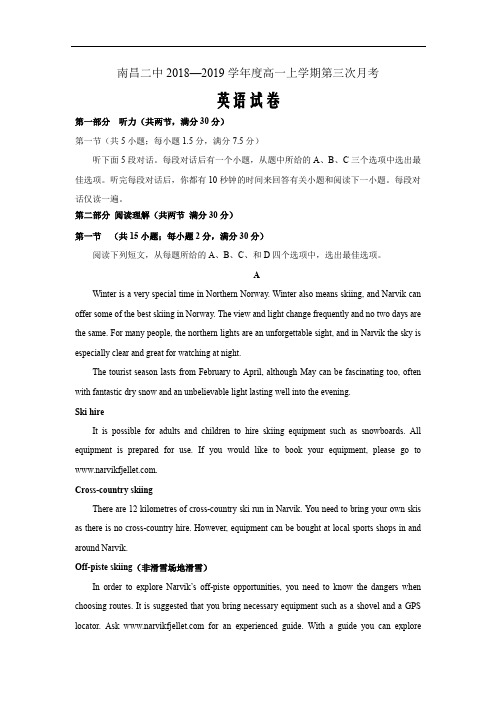
南昌二中2018—2019学年度高一上学期第三次月考英语试卷第一部分听力(共两节,满分30分)第一节(共5小题;每小题1.5分,满分7.5分)听下面5段对话。
每段对话后有一个小题,从题中所给的A、B、C三个选项中选出最佳选项。
听完每段对话后,你都有10秒钟的时间来回答有关小题和阅读下一小题。
每段对话仅读一遍。
第二部分阅读理解(共两节满分30分)第一节(共15小题;每小题2分,满分30分)阅读下列短文,从每题所给的A、B、C、和D四个选项中,选出最佳选项。
AWinter is a very special time in Northern Norway. Winter also means skiing, and Narvik can offer some of the best skiing in Norway. The view and light change frequently and no two days are the same. For many people, the northern lights are an unforgettable sight, and in Narvik the sky is especially clear and great for watching at night.The tourist season lasts from February to April, although May can be fascinating too, often with fantastic dry snow and an unbelievable light lasting well into the evening.Ski hireIt is possible for adults and children to hire skiing equipment such as snowboards. All equipment is prepared for use. If you would like to book your equipment, please go to .Cross-country skiingThere are 12 kilometres of cross-country ski run in Narvik. You need to bring your own skis as there is no cross-country hire. However, equipment can be bought at local sports shops in and around Narvik.Off-piste skiing(非滑雪场地滑雪)In order to explore Narvik’s offpiste opportunities, you need to k now the dangers when choosing routes. It is suggested that you bring necessary equipment such as a shovel and a GPS locator. Ask for an experienced guide. With a guide you can exploreNarvik’s special offpiste areas in a safe manner.Sometimes it is nice to do something different and not everybody enjoys skiing. Then you can go horse-riding, or visit the local museums.Price examples for the 2018/2019 season21. In Northern Norway, the tourists season may last ________.A. one monthB. two monthsC. three monthsD. four months22. What can we know from the passage?A. You can book skiing equipment through the Internet.B. You are provided with skiing equipment for free.C. Narvik is located in the south of Norway.D. Narvik is open to adults and children over eight.23.If Mr. and Mrs. Smith stay in Narvik with their six-year-old daughter for three days in 2019, they should pay ____________ .A. NOK 1,160B. NOK 1,425C. NOK 1,670D. NOK 2,260BI’d like to share a story that happened when I was four. I remember it clearly. Our loving family dog was nearing the end of his life. My father picked him up and put him in a little bed we had made for him. Our dog, my companion, whom we had cared for, bit (咬) my father when he tried to help him. How could he? Why? I couldn’t understand it. I didn’t like him anymore.I hadn’t thought about that story for a long time but something that happened last week brought it back to me. I went to speak with a friend. When I knocked on the door, I met an angry look and a few harsh (尖刻的) words. When the door was slammed (砰地关上) in my face, I stood there shocked, and in a rush, I was reminded of my dog bit my father 20 years ago or so.What brought that story back was that same feeling of betrayal (背叛).Both stories taught me something the next day. You see, when I got up in the morning and was told my dog had died, it became clear to me that he must have been in great pain. For him to have bitten a family member, he could not have been himself. Much the same for the other story when I learne d that my friend’s wife had just left him.We are all beings of our environments, our opinions and feelings. And all of those things can cause you to say and do things that can’t be understood by those who are not in the same situation with you.If you mee t someone either behaving out of character or acting in a way that doesn’t seem to fit the situation, put out your hand and be patient when you think it is least possible for him to do so. You may turn around a story that has a sad ending simply by your actions.24. What is the influence of the story mentioned in Paragraph 1?A. It hurt his father’s feeling deeply.B. It has puzzled the author ever since.C. It left a deep impression on the author.D. It made the author dislike dogs.25. What made the author think of the story of about 20 years ago?A. His friend’s attitude.B. The photo of the dog.C. His father’s wound.D. His friend’s suffering.26. Why did the author’s friend say harsh words to the author?A. He was ill-tempered.B. He was suffering the pain of losing his wife.C. He was bothered by an unexpected visit.D. They once quarreled and he couldn’t forgive the author.27. What’s the author’s advice to us?A. Help those in need.B. Look before you leap.C. Respect for others is a kind of virtue (美德).D. Learn to put yourself in others’ shoes.CAs for old people, some of the applications are hard to use because they didn’t grow up with them. They don’t have simple models of how they should work, what to do when som ethingdoesn’t work or where to go for help. We make it as easy as possible to be used for people who are not familiar with the technology.I think there is huge potential (潜力) and we are designing it. The ability to connect to friends, who remember the same movies and news and music, is really important, especially as people get old. They end up in retirement homes and they aren’t always close to their friends. Allowing the network to help them connect with friends and family is a really powerful thing.My mother is an enthusiastic user of the Internet, although it took me years to get her to use e-mail. She was born with normal hearing, but lost it when she was 3. She was totally deaf for many years, until age 53, when she got ear aids. They work really well. That is a big change for her. But before then, her friends couldn’t call her on the phone, so they insisted she use e-mail to communicate with them.Young people don’t even think of the Internet as technology. It’s just there, and they use it. There’s been a very interesting change in communications styles between old people and young people. There are some kids who are now in their teens and aren’t willing to make phone calls. And they think of e-mail as old-fashioned and slow.The reason why teens don’t make phone calls seems to be that they don’t know what to say. When they call they often stop for a while and there’s this silence. On the other hand, texting is considered proper, and it’s okay if you don’t answer. You might have been distracted. It’s not considered rude. But it is considered strange if you’re in this kind of voice conversation and simply stop talking.28.What is the trouble that old people meet when surfing the Internet?A. They don’t know how to use some applications.B. They have to buy electronic productions at a high price.C. There is no professional teacher to teach them how to use the Internet.D. They have no friends to communicate with online.29. What do the young people think of the Internet according to the passage?A. Interesting.B. Amazing.C. Boring.D. Common.30. We can infer from the passage that the author is a ________.A. company managerB. program designerC. college professorD. mobile phone seller31. What does the underlined sentence in the last paragraph probably mean?A. You have replied the message.B. You have walked away from the conversation.C. You have been cut off.D. You have asked for a pardon.DMany Americans buy an evergreen tree for Christmas. They put the tree in their home and hang small lights and colorful things on it. The evergreen is usually a pine or a fir tree (冷杉树). It remains green during the cold, dark months of winter in the northern part of the world. So it is a sign of everlasting life.Early long ago, Romans probably planted evergreen trees during a celebration in honor of their god of agriculture. The Christmas tree may have developed from a popular play performed hundreds of years ago in what is now Germany. Traditionally, the play was on December 24th, the day before Christmas. The play was about the first people that God created—Adam and Eve. People put apples on an evergreen tree to represent the tree of knowledge in the Garden of Eden.By the year 1600, some Germans began bringing evergreen trees into their homes. They put fruit, nuts and sweets on the trees. They gave the food to the family members and friends after the holiday season. Some people say the German religious reformer (宗教改革者) Martin Luther was the first person to add lighted candles to the tree. They say he did this to show how wonderful the stars had appeared as he travelled one night.In the early 1800’s, German settlers in the state of Pennsylvania were the first to celebrate the holiday with Christmas trees in the United States. The Christmas tree tradition spread to many parts of the world. Today, some form of the Christmas tree is part of most Christmas celebrations.32. Why do people choose the evergreen tree for the Christmas tree?A. It suffers from cold and dark months.B. It’s evergreen and represents long life.C. It’s convenient for people to put things on it.D. It can be found everywhere in winter.33. What can we infer from Paragraph 2?A. The Christmas tree dates back to ancient times.B. It was in a film that the Christmas tree was first used.C. Early Romans honored the god of wisdom with trees.D. The Christmas tree was considered as the tree of wealth.34. We can learn from the passage that _______.A. German settlers celebrated the holiday with fir treesB. Germans would give each other the food on the trees at ChristmasC. Martin Luther was the first person to decorate the Christmas treeD. many people in the world follow the Christmas tree tradition35. What’s the best title for this passage?A. How to Celebrate ChristmasB. The Use of Evergreen Trees During ChristmasC. The History of the Christmas TreeD. How to Decorate Christmas Tree第二节(共5小题;每小题2分,满分10分)根据短文内容,从短文后的选项中选出能填入空白处的最佳选项。
2018-2019学年高一英语下学期3月月考试题
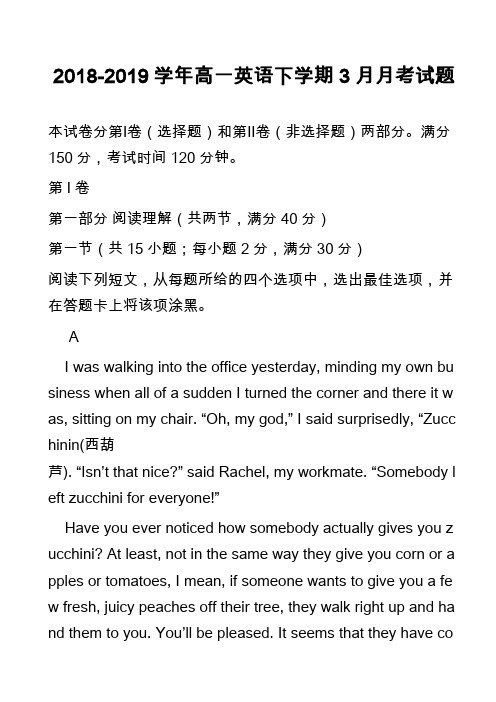
C.You can keep your money in the room safe in Fort Lauderdale Plaza Hotel.
D.In Beach Plaza Hotel a 24-hour maid is available.
C
We have two daughters: Kristen is seven years old and Kelly is four. Last Sunday evening,we invited some people home for dinner. I dressed them nicely for the party, and told them that their job was to join Mommy in answering the door when the bell rang. Mommy would introduce them to the guests, and then they would take the guests' coats upstairs and put them on the bed in the second bedroom.
ቤተ መጻሕፍቲ ባይዱFort Lauderdale Plaza Hotel
2018-2019学年高一英语3月月考试题

2018-2019学年高一英语3月月考试题第一部分听力(共两节,20小题,每小题1分,满分20分)1. Where are the speakers?A. In a supermarket.B. In a restaurant.C. At home.2. What will the woman probably do tomorrow afternoon?A. See a doctor.B. Meet her brother.C. Watch a movie.3. How will the speakers go to the bookstore?A. By bike.B. By bus.C. By taxi.4. What does the woman suggest the man do?A. Go to .B. Give up the program.C. Take three months off.5. What do we know about Dario?A. He feels hopeless.B. He likes Coke very much.C. H e was too busy to go shopping.第二节听第6段材料,回答第6、7题。
6. What kind of room does the woman want?A. A single room.B. A double room.C. A room for three.7. How much will the woman pay per night?A. $100.B. $120.C. $150.听第7段材料,回答第8、9题。
8. What are the speakers mainly talking about?A. The coming party.B. The house owner.C. The condition of a house.9. What was wrong with the house yesterday?A. Its pipe needed replacing.B. Its electricity went off. C . Its light was broken.听第8段材料,回答第10至12题。
2018-2019学年高一下学期第二次月考英语试题 Word版含答案

姓名,年级:时间:南昌十中2018—2019学年第二学期第二次月考参考答案听力1—5 BCABC 6-10 BCCCA 11-15 BCABC 16—20ABCCA阅读21—23DCB24-27ACBC28—31 BCDD 32-35DDCA36—40 EAGCD完形填空41—45 DACAB 46-50 DBCAB 51—55 BCADC 56-60 BACDB语法填空61。
wake 62. going 63. where 64. sits 65. off66.hunger 67。
disturbing 68. for 69. expanding 70. million 改错71.去掉been72.determined改为determination73.observed改为observing74.crowd改为crowding75.full改为fully76.去掉with77.discovery改为discoveries78.free改为freedom79.leading后加a80.reduced改为reduces[来源:学科网ZXXK]写作参考答案Dr。
Mr。
Smith,I’m Li Hua, a student from Cl ass II, Senior I. I’m writing to draw your attention to some improper behaviours among us s tudents。
Some students leave their leftover food everywhere, on the table or on the ground, which makes the hall rather unpleasant for us to come and eat there。
I wonder if the school could take measures to solve the problem。
江西省2019学年高一第二学期第三次月考英语试卷【含答案及解析】
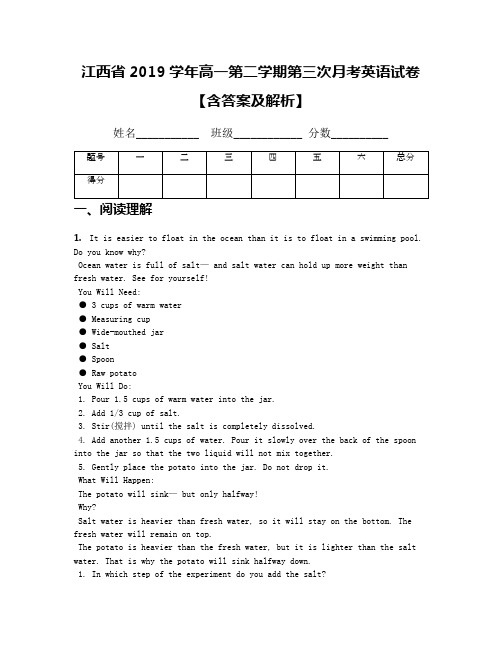
江西省2019学年高一第二学期第三次月考英语试卷【含答案及解析】姓名___________ 班级____________ 分数__________一、阅读理解1. It is easier to float in the ocean than it is to float in a swimming pool. Do you know why?Ocean water is full of salt— and salt water can hold up more weight than fresh water. See for yourself!You Will Need:● 3 cups of warm water● Measuring cup● Wide-mouthed jar● Salt● Spoon● Raw potatoYou Will Do:1. Pour 1.5 cups of warm water into the jar.2. Add 1/3 cup of salt.3. Stir(搅拌) until the salt is completely dissolved.4. Add another 1.5 cups of water. Pour it slowly over the back of the spoon into the jar so that the two liquid will not mix together.5. Gently place the potato into the jar. Do not drop it.What Will Happen:The potato will sink— but only halfway!Why?Salt water is heavier than fresh water, so it will stay on the bottom. The fresh water will remain on top.The potato is heavier than the fresh water, but it is lighter than the salt water. That is why the potato will sink halfway down.1. In which step of the experiment do you add the salt?A. Step 1.B. Step 2.C. Step 3.D. Step 4.2. In Step 4 of the experiment, why do you pour the water over the spoon “slowly”?A. It is easier to see what you are doing.B. It pushes the fresh water to the bottom.C. It will keep the water from coming out.D. It will keep the liquids from mixing together.3. In the experiment, what should you do right after you pour the water over the spoon?A. Add the salt to the water.B. Stir the salt into the water.C. Place the potato in the jar.D. Pour warm water into the jar.2. In 1971 a young man who grew up very poor was travelling across the country, trying to make a new start for himself. Along the way he had completely runout of( 用光 ) money and was forced to spend the night in his car. This continued until one morning, after a week of sleeping in his car, he walked nervously into a restaurant and ordered a big breakfast.After eating his first good meal in weeks, he found himself lying to the waiter, telling him he had lost his wallet. The waiter, who was also the owner, walked behind the chair where the young man had been sitting. He bent down,and came up with a $20 bill that looked as if it had fallen on the floor and said, “Son, you must have dropped this,” the owner said. The young man couldn’t believe his luck! He quickly paid for the breakfast, left a tip, bought gas with the change, and headed West.On the way out of town, he began to understand what the owner did. Maybe nobody dropped the money at all. “Maybe that fellow just knew I was introuble and he helped me in a way that didn’t embarrass( 使尴尬 ) me. So Ijust made a pro mise to help other people if I can.”Later, he worked very hard and became a rich man. Now he lives near Kansas City. Each year he gives away thousands of dollars. He is known as the“Secret Santa” because at Christmas time each year, he personally hands money out to those on the street and at restaurants. Last year, he gave more than $50,000 away in Kansas City.1.The young man was travelling across the country in 1971 to ________.A. look for a good restaurantB. improve his lifeC. show his new car to othersD. hand out dollars2.The underline sentence implies that the young man got to know that ________.A. it was very lucky of him to get his lost money back.B. it was very honest of the owner to return his moneyC. the owner helped him in a way that didn’t hurt his feelingD. another person who had breakfast in the restaurant lost the money3.From the end of the passage we can learn that ________.A. the man did carry out his promiseB. the man was not successful in the endC. the owner was paid back the moneyD. Santa give the man money each year4.The message of the story is“________”.A. One good turn deserves anotherB. Where there is a will , there is a wayC. He who travels far knows muchD. Give love wings( 翅膀 ) and it may fly higher3. When I was nine years old, I loved to go fishing with my dad. But the only thing that wasn’t very fun about it was that he could catch many fish while I couldn’t catch anything. I usually got pretty upset and kept asking him why. He alway s answered, “Son, if you want to catch a fish, you have to think like a fish”, I remember being even more upset then because, “I’m not a fish!”I didn’t know how to think like a fish. Besides, I reasoned, how could what I think influence what a fish does.As I got a little older I began to understand what my dad really meant. So, I read some books on fish. And I even joined the local fishing club and started attending the monthly meetings. I learned that a fish is a cold-blooded animal and therefore is very sensitive to water temperature. That is why fish prefer shallow water to deep water because the former is warmer. Besides, water is usually warmer in direct sunlight than in the shade. Yet, fish don’ t have any eyelids(眼皮) and the sun hurts their eyes… T he more I understood fish, the more I became effective at finding and catching them.When I grew up and entered the business world, I remember hearing my first boss say, “We all need to think like sales people.” But it didn’t completely make sense. My dad never once said, “If you want to catch a fish you need to think like a fisherman.” What he said was, “You need to think like a fish.” Years later, with great efforts to promote long-term services to people much older and richer than me, I gradually learned what we all need is to think more like customers. It is not an easy job. I will show you how in the following chapters.1. Why was the author upset in fishing trips when he was nine?A. He could not catch a fish.B. His father was not patient with him.C. His father did not teach him fishing.D. He could not influence a fish as his father did.2. According to the author, fish are most likely to be found _________.A. in deep water on sunny daysB. in deep water on cloudy daysC. in shallow water under sunlightD. in shallow water under waterside trees.3. After entering the business world, the author found _________.A. it easy to think like a customerB. his father’s fishing advice inspiringC. his first boss’s sales ideas reasona bleD. it difficult to sell services to poor people4. This passage most likely comes from _________.A. a fishing guideB. a popular sales bookC. a novel on childhoodD. a millionaire’s biography(自传)4. Can dogs and cats get along well in the same home? People who are thinking about getting a dog as a friend for their cat are worried that they will fight.A recent research has found that if the cat is taken back home before the dog, and if they are introduced when still young (less than 6 months for cats, a year for dogs), it is highly probable that the two pets will get along swimmingly . In two-thirds of the homes cats and dogs have a good relationship. However, it wasn’t all sweetness and light. There was a reported coldness between the cat and dog in 25% of the homes, while aggression(侵略,好斗) and fighting were found in 10% of the homes. One reason for this is probably that some of their body languages are just different. For example, when a cat turns its head away it means aggression, while a dog doing the same meanssubmission(顺从).In homes with cats and dogs living peacefully, researchers found a surprising behavior. They are learning how to talk each other’s language. It is asurprise that cats can learn how to talk “Dog”, and dogs ca n learn how totalk “Cat”.What’s interesting is that both cats and dogs have appeared to become smarter. They can learn to read each other’s body languages, suggesting that the two may have more in common than was expected. Once familiar with each other’s body language, cats and dogs can play together, and enjoy sleepingtogether on the sofa.The importance of this research on cats and dogs may go beyond pets — to people who don’t get along well, including neighbors, colleagues at work, and even countries. If cats and dogs can learn to get along, surely people have a good chance.1. The underlined word “swimmingly” in Paragraph 1 is closest in meaning to ________.A. earlyB. mostlyC. quicklyD. smoothly2. Some cats and dogs may fight when ________.A. they are cold to each otherB. they look away from each otherC. they are introduced at an early ageD. they misunderstand each other’s body languages3. It is suggested in Paragraph 4 that cats and dogs ________.A. have common interestsB. are less different than was thoughtC. have a common body languageD. are not so smart as was expected4. What can we human beings learn from cats and dogs?A. We should learn to get along well with others.B. We should know more about animals.C. We should live in peace with animals.D. We should learn more body languages.二、七选五5. Heart disease is the most common cause of death in the United States. Overa million people each year will have a heart attack and 25% will die beforethey get to the hospital or in the Emergency Department. 1. Prevention is the best way so it does not damage your heart and limit your ability to enjoy life. Simple ways might help reduce your risk:Don’t smokeThis means that you should stop smoking as soon as possible if you already smoke, and if you live with a smoker , you should put limits on the smoker. 2. Get moving3. Find a form of exercise you enjoy enough to want to do it regularly and stick to it. If you have health issues that limit exercise, see your doctorfor suggestions and make sure you begin with a program that will not be too challenging for you to keep with it.4.Make sure you follow a heart prevention diet, even if you don’t have any symptoms (症状) of heart disease. 5. You should eat a high-fiber, low-fat diet rich in fruits, vegetables and whole grains. Meats should be lean (瘦的),and fats should be limited to heart healthy fats such as olive oil. Sugars and processed foods should be limited, and fruits and vegetables should make up a large part of your daily meals.A. Eat healthy foodsB. Manage your weightC. A heart attack is a very frightening event.D. The key is to prevent the disease before it startsE. It’s best if you can get in 30 minutes a day of exercise.F. If you feel any of these heart attack symptoms, do not ignore.G. If you haven’t started smoking, be sure never to start this habit.三、完形填空6. I was in Houston a few weeks ago, and needed to be back home in Austin by the early morning the next day. So I ________ to leave that morning.________ my tire blew out on the way. I ________ a small parking lot. ThenI ________ the doors and picked up my phone to call a tow truck (拖车). Soona man ________ on my driver’s side window and asked if h e could help me. From his ________ and behavior, I knew he was far more ________ to rob than help me, so I ________ refused and told him the tow truck was due any minute. He asked again, but again I gently shook my head. He finally said, “Ma’am, you need ________ . A tow truck in Houston will arrive anywhere between 45 minutes and almost ________ (which I knew was true), and you are not going anywhere until you have that tire ________ .”I looked hard, straight into his ________ , and instinctively (凭直觉) saw someone different from the ________ person he appeared to be at first sight. So, against all reasonable ________ , but trusting my instincts, I got out. He looked ________ , but got right to work, trying to find the ________ tire. It took a while ________ it was stored under the seat.He changed the tire, ________ the seat to its place and said, “Thank you for letting me help you. You gave me a ________ when most people would never open the door to someone like me. Would it be oka y if I gave you a hug?” When I recovered, I gave him a giant hug. I left with a new tire and a renewed________ in human nature.1. A. wanted B. happened C. hoped D. had2. A. Amazingly B. Mostly C. Strangely D. Unfortunately3. A. pulled into B. walked around C. broke into D. looked at4. A. opened B. fixed C. locked D. broke5. A. hit B. knocked C. climbed D. checked6. A. mood B. personality C. height D. appearance7. A. willing B. friendly C. likely D. pleased8. A. repeatedly B. badly C. politely D. hurriedly9. A. money B. water C. gas D. help10. A. never B. now C. forever D. already11. A. balanced B. changed C. moved D. sold12. A. mind B. eyes C. head D. heart13. A. worried B. wise C. cold-hearted D. unreliable14. A. arguments B. judgments C. decisions D. selections15. A. devoted B. disappointed C. surprised D. frightened16. A. flat B. free C. spare D. worn17. A. so B. but C. once D. since18. A. returned B. left C. held D. showed19. A. lesson B. chance C. gift D. job20. A. pride B. delight C. faith D. interest四、短文填空7. The giant panda 1. (love) by people throughout the world. Chinesescientists 2. (recent) had a chance to study a wild female panda with a newborn baby. She was a very 3. (care)mother. For 25days, she never left her baby, not even to find something 4. (eat)! She would not let any other pandas come near. She licked(舐,舔)the baby constantly to keep it clean. Any smell might attract dangerous 5. (animal) that would try to eat the little comforting pats. The mother held the baby in her front paws much the way a human does. 6. it cried, she rocked it back and forth and gave it little comforting pats, The mother continued to care for the young panda 7. more than two years. By that time, the panda no longer needed 8. (it)mother for food. However, it stayed with her and leaned about the ways of the forest. Then, after two and a half years, the mother 9. (drive)the young panda away. It was time for her to have a new baby, and it was also time for the young panda to be 10. (depend).五、短文改错8. 假定英语课上老师要求同桌之间交换修改作文,请你修改你同桌写的以下作文。
江西省南昌市第十中学2018-2019学年高一英语上学期期中试题
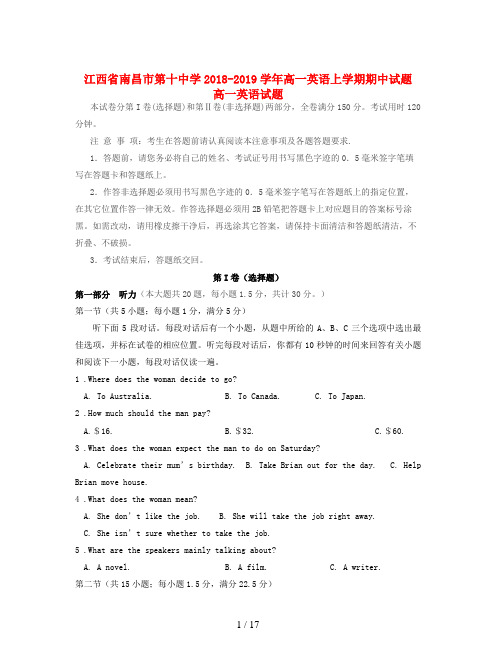
江西省南昌市第十中学2018-2019学年高一英语上学期期中试题高一英语试题本试卷分第I卷(选择题)和第Ⅱ卷(非选择题)两部分,全卷满分150分。
考试用时120分钟。
注意事项:考生在答题前请认真阅读本注意事项及各题答题要求.1.答题前,请您务必将自己的姓名、考试证号用书写黑色字迹的0.5毫米签字笔填写在答题卡和答题纸上。
2.作答非选择题必须用书写黑色字迹的0.5毫米签字笔写在答题纸上的指定位置,在其它位置作答一律无效。
作答选择题必须用2B铅笔把答题卡上对应题目的答案标号涂黑。
如需改动,请用橡皮擦干净后,再选涂其它答案,请保持卡面清洁和答题纸清洁,不折叠、不破损。
3.考试结束后,答题纸交回。
第I卷(选择题)第一部分听力(本大题共20题,每小题1.5分,共计30分。
)第一节(共5小题;每小题1分,满分5分)听下面5段对话。
每段对话后有一个小题,从题中所给的A、B、C三个选项中选出最佳选项,并标在试卷的相应位置。
听完每段对话后,你都有10秒钟的时间来回答有关小题和阅读下一小题,每段对话仅读一遍。
1 .Where does the woman decide to go?A. To Australia.B. To Canada.C. To Japan.2 .How much should the man pay?A.$16.B.$32.C.$60.3 .What does the woman expect the man to do on Saturday?A. Celebrate their mum’s birthday.B. Take Brian out for the day.C. Help Brian move house.4 .What does the woman mean?A. She don’t like the job.B. She will take the job right away.C. She isn’t sure whether to take the job.5 .What are the speakers mainly talking about?A. A novel.B. A film.C. A writer.第二节(共15小题;每小题1.5分,满分22.5分)听下面5段对话或独白。
1江西省南昌市第十中学2018_2019学年高一英语上学期期中试题
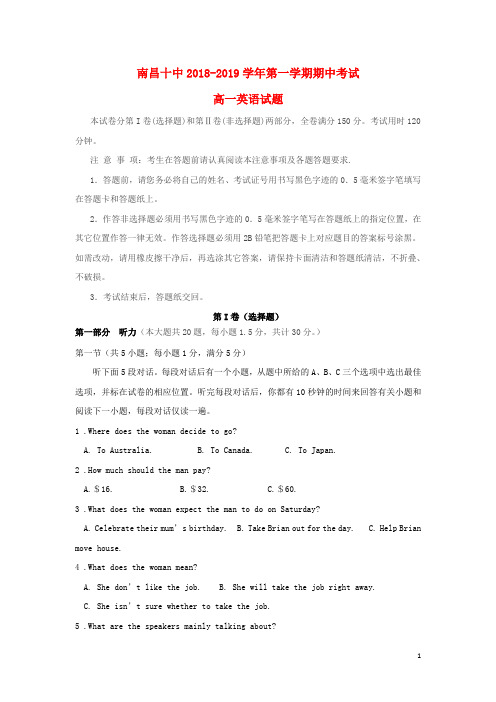
南昌十中2018-2019学年第一学期期中考试高一英语试题本试卷分第I卷(选择题)和第Ⅱ卷(非选择题)两部分,全卷满分150分。
考试用时120分钟。
注意事项:考生在答题前请认真阅读本注意事项及各题答题要求.1.答题前,请您务必将自己的姓名、考试证号用书写黑色字迹的0.5毫米签字笔填写在答题卡和答题纸上。
2.作答非选择题必须用书写黑色字迹的0.5毫米签字笔写在答题纸上的指定位置,在其它位置作答一律无效。
作答选择题必须用2B铅笔把答题卡上对应题目的答案标号涂黑。
如需改动,请用橡皮擦干净后,再选涂其它答案,请保持卡面清洁和答题纸清洁,不折叠、不破损。
3.考试结束后,答题纸交回。
第I卷(选择题)第一部分听力(本大题共20题,每小题1.5分,共计30分。
)第一节(共5小题;每小题1分,满分5分)听下面5段对话。
每段对话后有一个小题,从题中所给的A、B、C三个选项中选出最佳选项,并标在试卷的相应位置。
听完每段对话后,你都有10秒钟的时间来回答有关小题和阅读下一小题,每段对话仅读一遍。
1 .Where does the woman decide to go?A. To Australia.B. To Canada.C. To Japan.2 .How much should the man pay?A.$16.B.$32.C.$60.3 .What does the woman expect the man to do on Saturday?A. Celebrate their mum’s birthday.B. Take Brian out for the day.C. Help Brian move house.4 .What does the woman mean?A. She don’t like the job.B. She will take the job right away.C. She isn’t sure whether to take the job.5 .What are the speakers mainly talking about?A. A novel.B. A film.C. A writer.第二节(共15小题;每小题1.5分,满分22.5分)听下面5段对话或独白。
江西省南昌十中1819学年度高二3月月考——英语(英语)
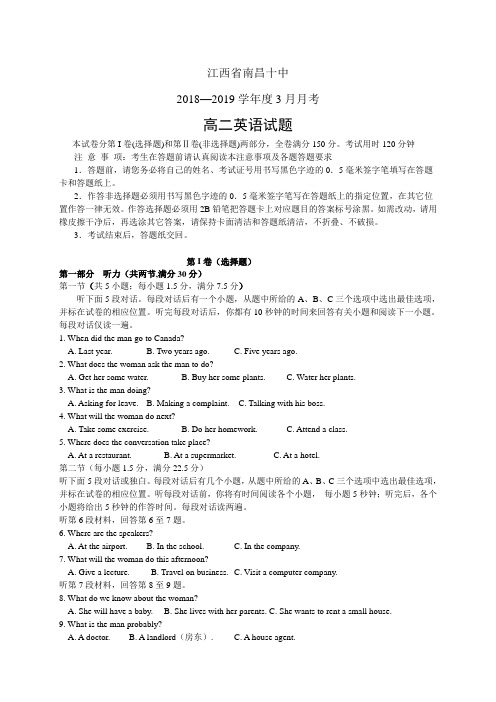
江西省南昌十中2018—2019学年度3月月考高二英语试题本试卷分第I卷(选择题)和第Ⅱ卷(非选择题)两部分,全卷满分150分。
考试用时120分钟注意事项:考生在答题前请认真阅读本注意事项及各题答题要求1.答题前,请您务必将自己的姓名、考试证号用书写黑色字迹的0.5毫米签字笔填写在答题卡和答题纸上。
2.作答非选择题必须用书写黑色字迹的0.5毫米签字笔写在答题纸上的指定位置,在其它位置作答一律无效。
作答选择题必须用2B铅笔把答题卡上对应题目的答案标号涂黑。
如需改动,请用橡皮擦干净后,再选涂其它答案,请保持卡面清洁和答题纸清洁,不折叠、不破损。
3.考试结束后,答题纸交回。
第I卷(选择题)第一部分听力(共两节,满分30分)第一节(共5小题;每小题1.5分,满分7.5分)听下面5段对话。
每段对话后有一个小题,从题中所给的A、B、C三个选项中选出最佳选项,并标在试卷的相应位置。
听完每段对话后,你都有10秒钟的时间来回答有关小题和阅读下一小题。
每段对话仅读一遍。
1. When did the man go to Canada?A. Last year.B. Two years ago.C. Five years ago.2. What does the woman ask the man to do?A. Get her some water.B. Buy her some plants.C. Water her plants.3. What is the man doing?A. Asking for leave.B. Making a complaint.C. Talking with his boss.4. What will the woman do next?A. Take some exercise.B. Do her homework.C. Attend a class.5. Where does the conversation take place?A. At a restaurant.B. At a supermarket.C. At a hotel.第二节(每小题1.5分,满分22.5分)听下面5段对话或独白。
2018-2019学年江西省南昌市四校高一下学期3月联考英语试题
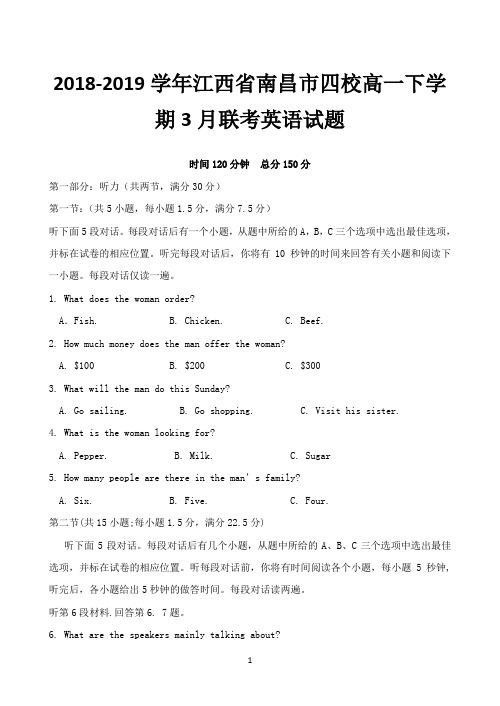
2018-2019学年江西省南昌市四校高一下学期3月联考英语试题时间120分钟总分150分第一部分:听力(共两节,满分30分)第一节:(共5小题,每小题1.5分,满分7.5分)听下面5段对话。
每段对话后有一个小题,从题中所给的A,B,C三个选项中选出最佳选项,并标在试卷的相应位置。
听完每段对话后,你将有10秒钟的时间来回答有关小题和阅读下一小题。
每段对话仅读一遍。
1. What does the woman order?A.Fish. B. Chicken. C. Beef.2. How much money does the man offer the woman?A. $100B. $200C. $3003. What will the man do this Sunday?A. Go sailing.B. Go shopping.C. Visit his sister.4. What is the woman looking for?A. Pepper.B. Milk.C. Sugar5. How many people are there in the man’s family?A. Six.B. Five.C. Four.第二节(共15小题;每小题1.5分,满分22.5分)听下面5段对话。
每段对话后有几个小题,从题中所给的A、B、C三个选项中选出最佳选项,并标在试卷的相应位置。
听每段对话前,你将有时间阅读各个小题,每小题5秒钟,听完后,各小题给出5秒钟的做答时间。
每段对话读两遍。
听第6段材料.回答第6. 7题。
6. What are the speakers mainly talking about?A. The reason the man missed workB. The reason the man was sick.C. The man was on vacation..7. What is the man’s reason for being gone?A. He was sick.B. His wife was sick.C. He was on vacation.听第7段材料.回答第8、9题。
江西省南昌十中2018_2019学年高一英语3月月考试题
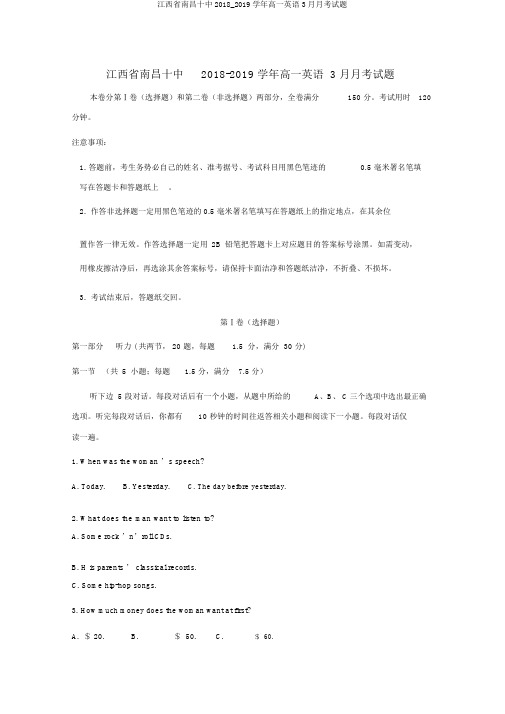
江西省南昌十中2018-2019 学年高一英语 3 月月考试题本卷分第Ⅰ卷(选择题)和第二卷(非选择题)两部分,全卷满分150 分。
考试用时120分钟。
注意事项:1. 答题前,考生务势必自己的姓名、准考据号、考试科目用黑色笔迹的0.5 毫米署名笔填写在答题卡和答题纸上。
2.作答非选择题一定用黑色笔迹的0.5 毫米署名笔填写在答题纸上的指定地点,在其余位置作答一律无效。
作答选择题一定用2B 铅笔把答题卡上对应题目的答案标号涂黑。
如需变动,用橡皮擦洁净后,再选涂其余答案标号,请保持卡面洁净和答题纸洁净,不折叠、不损坏。
3.考试结束后,答题纸交回。
第Ⅰ卷(选择题)第一部分听力 ( 共两节, 20 题,每题 1.5 分,满分 30 分)第一节(共5小题;每题 1.5 分,满分7.5 分)听下边 5 段对话。
每段对话后有一个小题,从题中所给的A、B、 C 三个选项中选出最正确选项。
听完每段对话后,你都有10 秒钟的时间往返答相关小题和阅读下一小题。
每段对话仅读一遍。
1. When was the woman ’s speech?A. Today.B. Yesterday.C. The day before yesterday.2.What does the man want to listen to?A. Some rock ’n’roll CDs.B. H is parents ’ classical records.C. Some hip-hop songs.3.How much money does the woman want at first?A. $ 20.B.$50.C.$60.4.What can we learn about the accident?A. The truck driver was killed.B. The two passengers survived.C. The car was not seriously damaged.5.When does the man want the woman to wake him up?A. At 9:00.B. At 7:00.C. At 6:50.第二节(共15 小题;每题 1.5 分,满分22.5 分)听下边5 段对话或独白。
江西省南昌十中1819学年度高一3月月考——英语(英语)
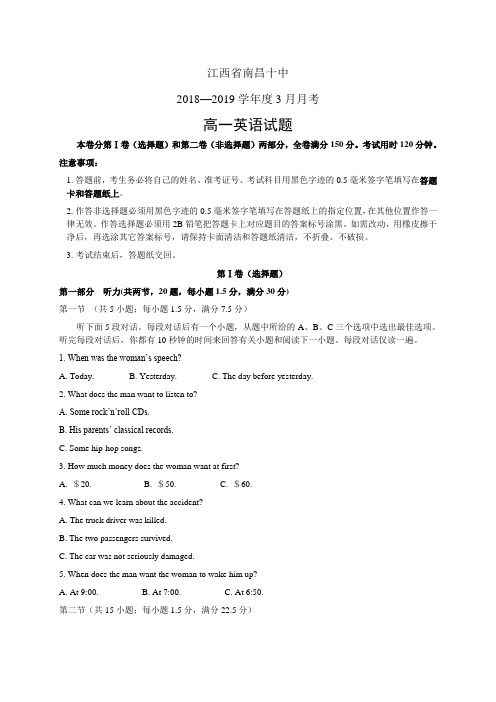
江西省南昌十中2018—2019学年度3月月考高一英语试题本卷分第Ⅰ卷(选择题)和第二卷(非选择题)两部分,全卷满分150分。
考试用时120分钟。
注意事项:1.答题前,考生务必将自己的姓名、准考证号、考试科目用黑色字迹的0.5毫米签字笔填写在答题卡和答题纸上。
2.作答非选择题必须用黑色字迹的0.5毫米签字笔填写在答题纸上的指定位置,在其他位置作答一律无效。
作答选择题必须用2B铅笔把答题卡上对应题目的答案标号涂黑。
如需改动,用橡皮擦干净后,再选涂其它答案标号,请保持卡面清洁和答题纸清洁,不折叠、不破损。
3.考试结束后,答题纸交回。
第Ⅰ卷(选择题)第一部分听力(共两节,20题,每小题1.5分,满分30分)第一节(共5小题;每小题1.5分,满分7.5分)听下面5段对话。
每段对话后有一个小题,从题中所给的A、B、C三个选项中选出最佳选项。
听完每段对话后,你都有10秒钟的时间来回答有关小题和阅读下一小题。
每段对话仅读一遍。
1. When was the woman’s speech?A. Today.B. Yesterday.C. The day before yesterday.2. What does the man want to listen to?A. Some rock’n’roll CDs.B. His parents’ classical records.C. Some hip-hop songs.3. How much money does the woman want at first?A. $20.B. $50.C. $60.4. What can we learn about the accident?A. The truck driver was killed.B. The two passengers survived.C. The car was not seriously damaged.5. When does the man want the woman to wake him up?A. At 9:00.B. At 7:00.C. At 6:50.第二节(共15小题;每小题1.5分,满分22.5分)听下面5段对话或独白。
江西省南昌市第十中学2019_2020学年高一英语上学期第二次月考试题
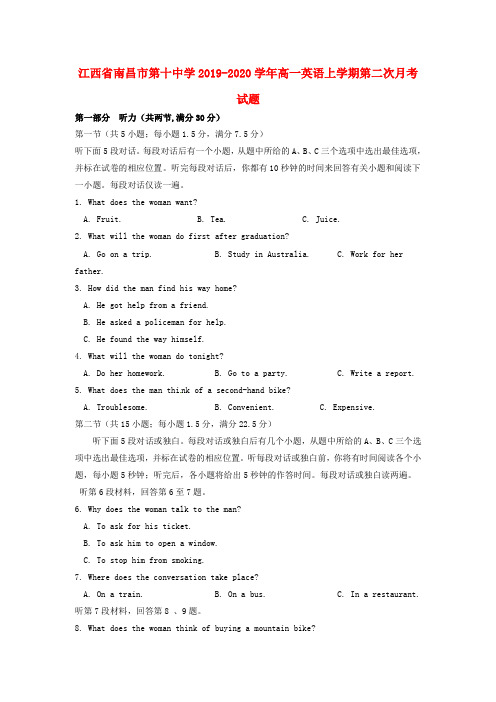
江西省南昌市第十中学2019-2020学年高一英语上学期第二次月考试题第一部分听力(共两节,满分30分)第一节(共5小题;每小题1.5分,满分7.5分)听下面5段对话。
每段对话后有一个小题,从题中所给的A、B、C三个选项中选出最佳选项,并标在试卷的相应位置。
听完每段对话后,你都有10秒钟的时间来回答有关小题和阅读下一小题。
每段对话仅读一遍。
1. What does the woman want?A. Fruit.B. Tea.C. Juice.2. What will the woman do first after graduation?A. Go on a trip.B. Study in Australia.C. Work for her father.3. How did the man find his way home?A. He got help from a friend.B. He asked a policeman for help.C. He found the way himself.4. What will the woman do tonight?A. Do her homework.B. Go to a party.C. Write a report.5. What does the man thi nk of a second-hand bike?A. Troublesome.B. Convenient.C. Expensive.第二节(共15小题;每小题1.5分,满分22.5分)听下面5段对话或独白。
每段对话或独白后有几个小题,从题中所给的A、B、C三个选项中选出最佳选项,并标在试卷的相应位置。
听每段对话或独白前,你将有时间阅读各个小题,每小题5秒钟;听完后,各小题将给出5秒钟的作答时间。
每段对话或独白读两遍。
听第6段材料,回答第6至7题。
6. Why does the woman talk to the man?A. To ask for his ticket.B. To ask him to open a window.C. To stop him from smoking.7. Where does the conversation take place?A. On a train.B. On a bus.C. In a restaurant. 听第7段材料,回答第8 、9题。
江西省南昌十中2018_2019学年高二英语3月月考试题
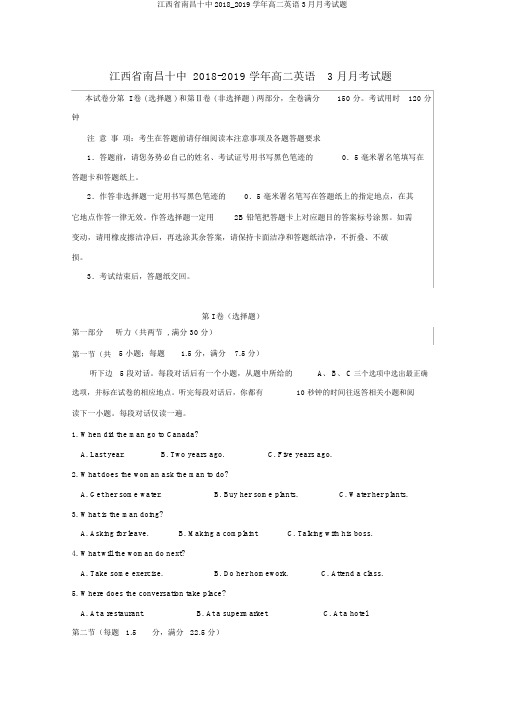
江西省南昌十中 2018-2019 学年高二英语 3 月月考试题本试卷分第 I 卷 ( 选择题 ) 和第Ⅱ卷 ( 非选择题 ) 两部分,全卷满分150 分。
考试用时120 分钟注意事项:考生在答题前请仔细阅读本注意事项及各题答题要求1.答题前,请您务势必自己的姓名、考试证号用书写黑色笔迹的0.5 毫米署名笔填写在答题卡和答题纸上。
2.作答非选择题一定用书写黑色笔迹的0.5 毫米署名笔写在答题纸上的指定地点,在其它地点作答一律无效。
作答选择题一定用2B 铅笔把答题卡上对应题目的答案标号涂黑。
如需变动,请用橡皮擦洁净后,再选涂其余答案,请保持卡面洁净和答题纸洁净,不折叠、不破损。
3.考试结束后,答题纸交回。
第 I 卷(选择题)第一部分听力(共两节 , 满分 30 分)第一节(共 5 小题;每题 1.5 分,满分7.5 分)听下边 5 段对话。
每段对话后有一个小题,从题中所给的A、 B、 C 三个选项中选出最正确选项,并标在试卷的相应地点。
听完每段对话后,你都有10 秒钟的时间往返答相关小题和阅读下一小题。
每段对话仅读一遍。
1.When did the man go to Canada?A. Last year.B. Two years ago.C. Five years ago.2.What does the woman ask the man to do?A. Get her some water.B. Buy her some plants.C. Water her plants.3.What is the man doing?A. Asking for leave.B. Making a complaint.C. Talking with his boss.4.What will the woman do next?A. Take some exercise.B. Do her homework.C. Attend a class.5.Where does the conversation take place?A. At a restaurant.B. At a supermarket.C. At a hotel.第二节(每题 1.5分,满分22.5 分)听下边 5 段对话或独白。
江西省南昌十中2018-2019学年高二下学期3月月考英语试题 Word版含答案
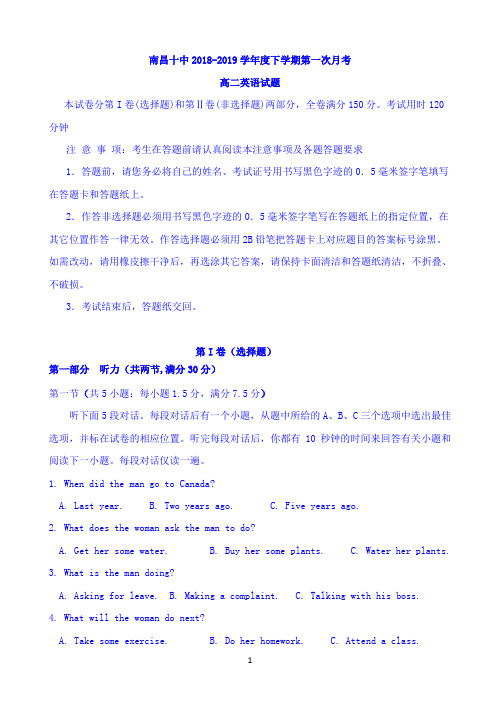
南昌十中2018-2019学年度下学期第一次月考高二英语试题本试卷分第I卷(选择题)和第Ⅱ卷(非选择题)两部分,全卷满分150分。
考试用时120分钟注意事项:考生在答题前请认真阅读本注意事项及各题答题要求1.答题前,请您务必将自己的姓名、考试证号用书写黑色字迹的0.5毫米签字笔填写在答题卡和答题纸上。
2.作答非选择题必须用书写黑色字迹的0.5毫米签字笔写在答题纸上的指定位置,在其它位置作答一律无效。
作答选择题必须用2B铅笔把答题卡上对应题目的答案标号涂黑。
如需改动,请用橡皮擦干净后,再选涂其它答案,请保持卡面清洁和答题纸清洁,不折叠、不破损。
3.考试结束后,答题纸交回。
第I卷(选择题)第一部分听力(共两节,满分30分)第一节(共5小题;每小题1.5分,满分7.5分)听下面5段对话。
每段对话后有一个小题,从题中所给的A、B、C三个选项中选出最佳选项,并标在试卷的相应位置。
听完每段对话后,你都有10秒钟的时间来回答有关小题和阅读下一小题。
每段对话仅读一遍。
1. When did the man go to Canada?A. Last year.B. Two years ago.C. Five years ago.2. What does the woman ask the man to do?A. Get her some water.B. Buy her some plants.C. Water her plants.3. What is the man doing?A. Asking for leave.B. Making a complaint.C. Talking with his boss.4. What will the woman do next?A. Take some exercise.B. Do her homework.C. Attend a class.5. Where does the conversation take place?A. At a restaurant.B. At a supermarket.C. At a hotel.第二节(每小题1.5分,满分22.5分)听下面5段对话或独白。
2018-2019学年江西省南昌市第十中学高一上学期期末考试英语试题
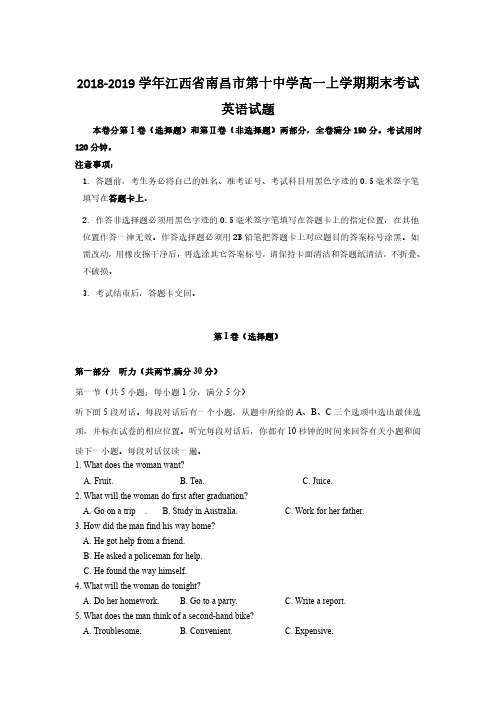
2018-2019学年江西省南昌市第十中学高一上学期期末考试英语试题本卷分第Ⅰ卷(选择题)和第Ⅱ卷(非选择题)两部分,全卷满分150分。
考试用时120分钟。
注意事项:1.答题前,考生务必将自己的姓名、准考证号、考试科目用黑色字迹的0.5毫米签字笔填写在答题卡上。
2.作答非选择题必须用黑色字迹的0.5毫米签字笔填写在答题卡上的指定位置,在其他位置作答一律无效。
作答选择题必须用2B铅笔把答题卡上对应题目的答案标号涂黑。
如需改动,用橡皮擦干净后,再选涂其它答案标号,请保持卡面清洁和答题纸清洁,不折叠、不破损。
3.考试结束后,答题卡交回。
第I卷(选择题)第一部分听力(共两节,满分30分)第一节(共5小题;每小题1分,满分5分)听下面5段对话。
每段对话后有一个小题,从题中所给的A、B、C三个选项中选出最佳选项,并标在试卷的相应位置。
听完每段对话后,你都有10秒钟的时间来回答有关小题和阅读下一小题。
每段对话仅读一遍。
1.What does the woman want?A.Fruit.B.Tea.C.Juice.2.What will the woman do first after graduation?A.Go on a trip.B.Study in Australia.C.Work for her father.3.How did the man find his way home?A.He got help from a friend.B.He asked a policeman for help.C.He found the way himself.4.What will the woman do tonight?A.Do her homework.B.Go to a party.C.Write a report.5.What does the man think of a second-hand bike?A.Troublesome.B.Convenient.C.Expensive.第二节(共15小题;每小题1分,满分15分)听下面5段对话或独白。
- 1、下载文档前请自行甄别文档内容的完整性,平台不提供额外的编辑、内容补充、找答案等附加服务。
- 2、"仅部分预览"的文档,不可在线预览部分如存在完整性等问题,可反馈申请退款(可完整预览的文档不适用该条件!)。
- 3、如文档侵犯您的权益,请联系客服反馈,我们会尽快为您处理(人工客服工作时间:9:00-18:30)。
江西省南昌十中2018-2019学年高一英语3月月考试题本卷分第Ⅰ卷(选择题)和第二卷(非选择题)两部分,全卷满分150分。
考试用时120分钟。
注意事项:1.答题前,考生务必将自己的姓名、准考证号、考试科目用黑色字迹的0.5毫米签字笔填写在答题卡和答题纸上。
2.作答非选择题必须用黑色字迹的0.5毫米签字笔填写在答题纸上的指定位置,在其他位置作答一律无效。
作答选择题必须用2B铅笔把答题卡上对应题目的答案标号涂黑。
如需改动,用橡皮擦干净后,再选涂其它答案标号,请保持卡面清洁和答题纸清洁,不折叠、不破损。
3.考试结束后,答题纸交回。
第Ⅰ卷(选择题)第一部分听力(共两节,20题,每小题1.5分,满分30分)第一节(共5小题;每小题1.5分,满分7.5分)听下面5段对话。
每段对话后有一个小题,从题中所给的A、B、C三个选项中选出最佳选项。
听完每段对话后,你都有10秒钟的时间来回答有关小题和阅读下一小题。
每段对话仅读一遍。
1. When was the woman’s speech?A. Today.B. Yesterday.C. The day before yesterday.2. What does the man want to listen to?A. Some rock’n’roll CDs.B. His parents’ classical records.C. Some hip-hop songs.3. How much money does the woman want at first?A. $20.B. $50.C. $60.4. What can we learn about the accident?A. The truck driver was killed.B. The two passengers survived.C. The car was not seriously damaged.5. When does the man want the woman to wake him up?A. At 9:00.B. At 7:00.C. At 6:50.第二节(共15小题;每小题1.5分,满分22.5分)听下面5段对话或独白。
每段对话或独白后有几个小题,从题中所给的A、B、C三个选项中选出最佳选项。
听每段对话或独白前,你将有时间阅读各个小题,每小题5秒钟;听完后,各小题将给出5秒钟的作答时间。
每段对话或独白读两遍。
听第6段材料,回答第6、7题。
6. Where do the speakers live now?A. In a village.B. In a factory.C. In a forest.7. Why didn’t the woman sleep well last night?A. There were a lot of loud people.B. It was too quiet nearby.C. She was afraid of the noisy birds.听第7段材料,回答第8、9题。
8. Where does the conversation take place?A.At a train station.B.At Alice’s wedding.C.At Uncle John’s house.9. How does the man describe the woman when she was little?A. Naughty.B. Smart.C. Quiet.听第8段材料,回答第10至12题。
10. What does the man want to do this summer?A. Earn some money.B. Take a vacation.C. Stay at home.11. What did Eric do last summer?A. He babysat for Mr. Cohen.B. He watered houseplants for Mr. Dodd.C. He took care of Mr. Cohen’s pets.12. What does the woman advise the man to do first?A. Contact the house owners himself.B. Go to the student employment office.C. Fill out an application on the Internet.听第9段材料,回答第13至16题。
13. Who is the man talking to?A. A class of students.B. A group of hotel guests.C. A tour group.14. What is Hawaii’s largest island called?A. Polynesia.B. The Big Island.C. Island of the Americas.15. What is the woman interested in?A. The location of Hawaii.B. The weather of Hawaii.C. The population of Hawaii.16. How many languages are mainly spoken in Hawaii?A. Two.B. Three.C. Four.听第10段材料,回答第17至20题。
17. Where did Peter and Paul want to camp?A. Near a river.B. In the woods.C. Close to their farm.18. What did Peter and Paul eat for dinner?A. Sandwiches.B. Fish.C. Nuts.19. What happened to Peter and Paul?A. They got lost.B. They lost their tent.C. They had nowhere to set up their tent.20. What was Peter’s idea?A. Making a new path.B. Changing where to camp.C. Following the marks they had left.第二部分阅读理解(共两节,满分40分)第一节(共15小题:每小题2分,满分30分)阅读下列短文,从每题所给的A、B、C和D四个选项中,选出最佳选项。
ASummer Camps in Season!STEM Camp July 10 to August 14, Cost: $18090% of the jobs in the future will require STEM (Science, Technology, Engineering & Mathematics) education. We find ways to make learning fun and exciting for students to help ensure their futures. Campers participate in fun and engaging STEM activities! Register: or call 519-475-6600.Kandalore June 15 to 28, Cost: $2,340The finest traditional camp in Canada, provides the best of both canoe (独木舟) adventures and incamp activities. For more than 65 years, Kandalore has given campers the opportunity to know and be themselves. We create a warm and supportive environment where kids can express their unique self, grow in selfconfidence and build lifetime friendships. Register: or call 416-322-9735.ESL Summer Camp June 25 to July 21, Cost: $5,500Pickering College has an exciting ESL summer camp for students aged 12-18 who want to learn English and experience the wonders of summer at our 42acre campus; students enjoy the excellent dormitory, dining, academic, and social facilities of one of Canada's oldest independent schools. Register: or call 905-175-8900.DEEP Summer Academy August 16 to 26, Cost: $465We provide highly motivated high school students from across the world with the opportunity for advanced study in a variety of engineering, technology, business and science subjects. Organized by the University of Toronto, DEEP is one of the most diverse preuniversity engineering programs all over the world with scholarships. Register: or call 416-946-0816.21.Which number should you call if you want to improve your English?A.519-475-6600. B.416-322-9735.C.416-946-0816. D.905-175-8900.22.When will the shortest camp start?A.On July 10. B.On June 15.C.On June 25. D.On August 16.23.Where can you go if you are interested in the experience of adventure?A.Kandalore.B.STEM Camp.C.ESL Summer Camp.D.DEEP Summer Academy.24.How similar are STEM Camp and DEEP Summer Academy?A.They both offer scholarships for students.B.They provide the same courses for students.C.They both prepare students for their development.D.They are both designed for international students.BIn our everyday lives we meet situations in which we take many things for granted. We only treasure things when they are gone. This is a sad truth of human nature. One day, I found myself as a witness to a similar situation.One evening, I left work and boarded the train.After entering, I noticed something unusual. The center of the car had a few empty seats while both ends were crowded with people standing. I didn't pay much attention and sat down on one of the empty seats.I sensed a funny smell. It wasn't long before I noticed a homeless person sleeping on three seats in front of me. He was bleeding from his nose. Why wasn't anyone helping him?His clothes were torn and he was giving off a strange smell. Along with the smell, his eyes were dull, watery, and red. Occasionally he scratched himself and people looked at him as if he had committed a crime. As the train stopped at stations and more people came in they covered their noses and faced away from him. All the seats around him were empty.Suddenly, he began to swear at the people around him. A plainclothes police officer who looked like a construction worker took out his certificate and showed it to the homeless man. The officer, not wanting to touch the homeless man, told him his rights and directed him to exit the train.As the officer walked the man out of the train, the homeless man turned around and said “MY HOME!” and started crying.A man doesn't value things until they are gone. If he didn't have a home, at least he had freedom.Now he has neither. No one wants to help someone who won't help himself.25.When entering the car, how did the author feel at first?A.Annoyed. B.Puzzled.C.Sad. D.Calm.26.How did people react to the homeless man?A.They caught him and called the police.B.They covered him with clean clothes.C.They disliked and avoided him.D.They stared at him curiously.27.It can be learned that the policeman ________.A.was very rude to the manB.sent the man back to his hometownC.forced the man to leave the cityD.went off the train with the man28.What does the author think of the homeless man?A.He is a loser of life.B.He is worth our respect.C.He is very funny.D.He is a fearless fighter.CA record of 6.15 million trips was made by Chinese mainland tourists to overseas destinations during the sevenday Spring Festival holiday, which ended on Thursday, according to the China National TourismAdministration. That is an increase of 7 percent compared with last year's Spring Festival. About 374,000 trips were organized by travel agencies, a 2.5 percent increase.The administration also reported growth from individual and highend(高端的) travelers and said that in addition to top and coastal cities, inland cities—such as those in the Guangxi Zhuang Autonomous Region—became important source markets. With many Chinese now traveling abroad for Spring Festival, their choice of destinations has expanded along with their growing interest in foreign cultures and services.“Chinese tourists are increasingly willing to experience local cultures and services, including staying in private homes, appreciating plants and watching monkeys in hot springs,” Li Xuejing, the agency's marketing manager, said.A Chinese tourist surnamed Guo, who was vacationing on an island in the Philippines, said: “I now pay more attention to relaxation and enjoyment during the holidays instead of shopping or choosing gifts for relatives.”Another choice is Britain. Though the devaluation(货币贬值) of the pound is a factor, Britain's rich history and famous education tradition have caught the eye of Chinese.29.How many trips were made to foreign countries during the Golden Week of this Spring festival holiday?A.6,150,000. B.2,500,000. C.7,000,000. D.374,000.30.What can we learn about some inland cities in Guangxi?A.They're reported to have become important attractions.B.They're famous for all kinds of plants and monkeys.C.They have the best hot spring in the world.D.They belong to coastal source markets.31.What would Miss Guo do on her vacation according to the text?A.Go shopping for gifts.B.Study foreign cultures.C.Relax and enjoy herself.D.Chat with her relatives.32.Where does the text probably come from?A.A guide book.B.A newspaper.C.A scientific magazine.D.An advertisement.DIn 1947 a group of famous people from the art world headed by an Austrian conductor decided to hold an international festival(节日)of music, dance and theatre in Edinburgh. The idea was to reunite Europe after the Second World War.It quickly attracted famous names such as Alec Guinness, Richard Burton, Dame Margot Fonteyn and Marlene Dietrich as well as the big symphony orchestras(交响乐团). It became a fixed event every August and now attracts 400,000 people yearly.At the same time, the“Fringe” appeared as a challenge to the official festival. Eight theatre groups turned up uninvited in 1947, in the beliefthat everyone should have the right to perform, and they did so in a public house disused for years.Soon, groups of students firstly from Edinburgh University, and later from the universities of Oxford and Cambridge, Durham and Birmingham were making the journey to the Scottish capital each summer to perform theatre by littleknown writers of plays in small church halls to the people of Edinburgh.Today the “Fringe”, once less recognized, has far outgrown (飞速发展) the festival with around 1,500 performances of theatre, music and dance on every one of the 21 days it lasts. And yet as early as 1959, with only19 theatre groups performing, some said it was getting too big.A paid administrator(行政人员)was first employed only in 1971, and today there are eight administrators working all year round and the number rises to 150 during August itself. In 2004 there were 200 places housing 1,695 shows by over 600 different groups from 50 different countries. More than 1.25 million tickets were sold.33.What was the purpose of Edinburgh Festival at the beginning?A.To bring Europe together again.B.To honor heroes of World WarC.To introduce young theatre groups.D.To attract great artists from Europe.34.Why did some uninvited theatre groups come to Edinburgh in 1947?A.They owned a public house there.B.They came to take up a challenge.C.They thought they were also famous.D.They wanted to take part in the festival.35.We may learn from the text that Edinburgh FestivalA.has become a nonofficial eventB.has gone beyond an art festivalC.gives shows all year roundD.keeps growing rapidly第二节 (共5小题:每小题2分,满分10分)根据短文内容,从短文后的选项中选出能填入空白处的最佳选项。
